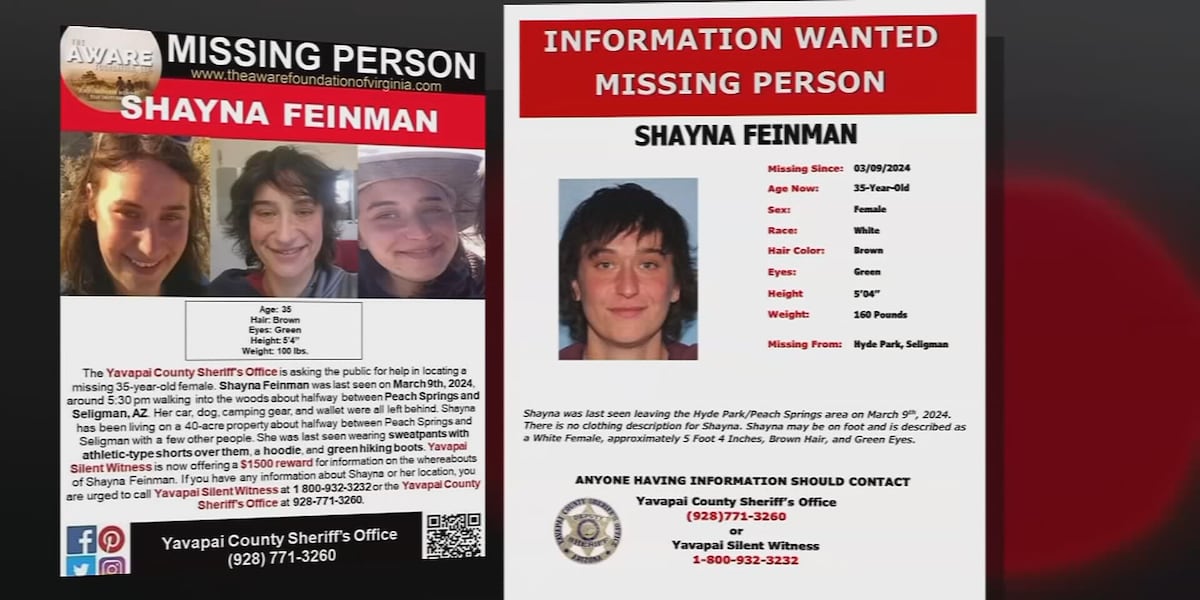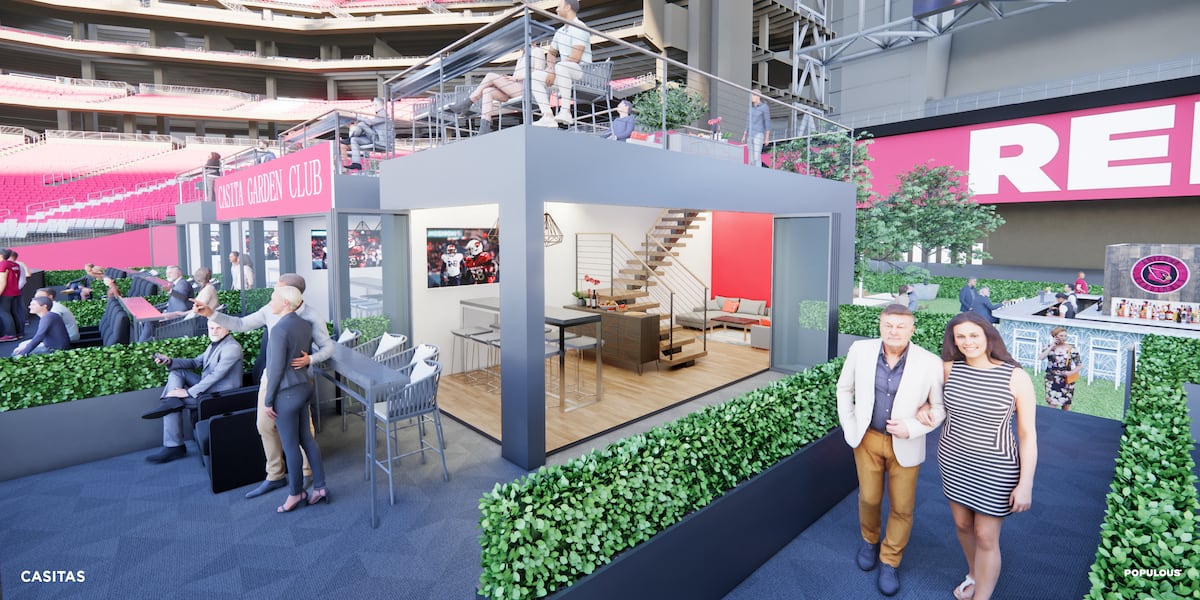Arizona
11 “fake electors” indicted in Arizona


Arizona
Witness recounts odd moments before and after Shayna Feinman vanished in northern Arizona

SELIGMAN, AZ (AZFamily) — A witness is revealing more about the mystery disappearance of an Arizona woman.
The witness lived on the property with 35-year-old Shayna Feinman, who vanished two months ago.
She’s bothered by what happened the last time she saw Feinman and by what happened to other people on the property.
The Yavapai County Sheriff’s Office has said multiple people are not cooperating in the investigation.
This witness, who we are referring to as “Kelly” to protect her identity, helped file the missing person report after Feinman was missing for more than a week.
She said it took two people getting arrested on other charges before she felt comfortable sharing what she heard and saw the night Feinman vanished.
Kelly saw Feinman after an argument with their property manager.
Then, she was gone.
“If she was still alive, I feel like things would make sense,” said Kelly.
Kelly said that the argument she heard was because their property manager told Feinman she could no longer live in the cabin.
“They were yelling and screaming at each other. He’s like, ‘You have to leave. I’m calling the sheriff.’ She’s like, ‘I need to get my phone and keys,’” Kelly remembered hearing.
Kelly said Feinman was walking toward the back of the property where her car was and then was never seen or heard from again.
Kelly said Feinman and her boyfriend would often leave for days at a time, so at first, she wasn’t alarmed, but after more than a week, Kelly and their neighbor, who was watching Feinman’s dog Stormy made a missing person report on March 9.
“She would have her car; she would have Stormy. All those things would be missing, not just her,” said Kelly.
Kelly said she was upset by her property manager’s reaction and recalled what he told her.
“You shouldn’t have made the missing persons report because you’re just making a big deal out of nothing,” she recalled him telling her.
The Yavapai County Sheriff’s Office said at this point they can’t rule out foul play and multiple people are not cooperating in the investigation.
Feinman’s sister told Arizona’s Family those two people are the property manager and Shayna’s boyfriend.
Kelly said the official police search of the property was done two weeks after they made the missing person report, but she said prior to that, Feinman’s boyfriend didn’t help or say much about her disappearance.
“Hey man, you’re not calling, you’re not texting, how come you’re not out here looking for your girlfriend? I’m out here in the snow with her dog, and you’re just MIA,” Kelly said.
Kelly said by the time Easter rolled around, she left to go stay with a neighbor because she felt uneasy about what was happening.
She said she felt comfortable sharing this now after the property manager and boyfriend were arrested on other charges.
Court documents show they were arrested late last month for vehicle theft, and the property manager, for possessing a weapon he shouldn’t have.
Kelly has her own theory of what happened, but it still leaves so much mystery as to where Feinman is.
“I think that she’s not alive. I think that she got into some kind of accident with one of them, or both of them, or something, because she would be found by now if she was still out there,” Kelly said.
Last week, YCSO increased the reward for information in Feinman’s disappearance to $10,000.
YCSO is asking for anyone who may have information about Shayna’s whereabouts on or after March 9, 2024, or if there is camera footage that may be relevant or seems suspicious, to please call either YCSO at 928-771-3260 or Silent Witness 800 932-3232.
People may also file a tip online at yavapaisw.com
See a spelling or grammatical error in our story? Please click here to report it.
Do you have a photo or video of a breaking news story? Send it to us here with a brief description.
Copyright 2024 KTVK/KPHO. All rights reserved.
Arizona
Video: Arizona treasurer discusses anti-boycott divestment sanctions amid university protests – KTAR.com

Kimberly Yee, Treasurer of Arizona and the highest-ranking GOP official in the state, joined the AZ Political Podcast to talk achievements from her 2022 campaign and shed light on Arizona’s stance on anti-boycott divestment sanctions. This comes amid protest demands from students at ASU and University of Arizona for divestment from Israeli companies. Yee also shared a story about about spending time at her majority leader desk with the late Sandra Day O’Connor.
Video: Jeremy Schnell and Felisa Cárdenas/KTAR News
Photos: Bob Christie/AP; Getty Images
Arizona
Report ranks Arizona 49th in adult mental health care

Sky Schaudt/KJZZ
The entrance of the Arizona State Hospital in Phoenix.
Mental Health America ranked Arizona 49th in the nation for adult mental health care. The national nonprofit determines rankings based on the prevalence of mental illness and the access to mental health care. Arizona’s 2023 ranking of 49 out of 51 is based on the state having a higher prevalence of mental illness and lower access to insurance and treatment.
For Rachel Streiff, an organizer and member of Arizona Mad Moms, this ranking was no surprise. She and other family members, caregivers and friends of individuals with severe mental illness have been advocating on their behalf for adequate psychiatric services and treatment for quite some time.
“[Arizona Mad Moms] really organized itself,” Streiff said. “The end result of not providing these long-term and acute levels of care is that families are feeling that heavy burden.”
Streiff was granted legal guardianship over her 31-year-old friend, whom she identified only as Kelsey, in 2022, and has been supervising her medical needs since then.
“She’s been in and out of the hospital for years, and she hasn’t received effective long-term stabilization and treatment,” Streiff said. “Her illness is very complicated and it’s beyond what current community treatment services are equipped to handle.”
Kelsey, who currently lives in a behavioral health residential facility, was assigned to Streiff’s care with her mother’s permission.
Streiff said that going to court to obtain a guardianship can be difficult and very expensive.
“Families that can’t afford an attorney or can’t afford to hire a private doctor don’t have the ability to get that kind of order,” Streiff said.
“I took on her case because her parents were aging and her father recently passed away,” Streiff said. “She just didn’t have anyone to advocate for her.”
Legal guardianship gives Streiff permission to attend doctor appointments and, by Arizona law, she must be included in all conversations regarding Kelsey’s medications.
“In those discussions, individuals with an SMI (severe mental illness) really can’t communicate whether a medication is working or not,” Streiff said. “They may also have incorrect ideas about what’s actually helpful.”
In January, Streiff said Kelsey was prescribed the incorrect dosage for medication given after her discharge from the hospital, which resulted in a seizure two days later.
“I verified the medications that were on the sheet leaving the hospital, but I did not verify what was actually filled in the prescriptions that arrived at her residential placement,” Streiff said. “How would the average person with a serious mental illness that didn’t have a guardian even know that mistakes are being made in their treatment?”
An SMI is “a chronic and long term mental health condition that impacts a person’s ability to perform day-to-day activities or interactions,” according to the Arizona Health Care Cost Containment System.
SMIs are most commonly treated with psychotherapy and medications. Some people with SMIs need heavy supervision and some do not. Kelsey needs the level of supervision that happens in a residential facility, like the one she’s in now.
Streiff’s guardianship has enabled her to get Kelsey into a behavioral health residential facility, or BHRF.
“Having the means for her (Kelsey’s) family and friends to be able to do that is why she’s doing well where she’s at today,” Streiff said.
Although she doesn’t need restraint, Kelsey does need full-time care and help with decision making. Strieff points out that there’s capacity in what are known as “voluntary” facilities, for individuals who are able to advocate for themselves, but there is a lack of resources for highly vulnerable individuals who need constant care, like Kelsey.
Acute locked facilities, like the Arizona Department of Health Services’ Arizona State Hospital in Phoenix, provide “the highest and most restrictive” level of care in the state, according to AZDHS. Patients who cannot be treated in a community facility or cannot receive care due to their criminal legal status are admitted. The Arizona State Hospital is able to hold 260 patients, with 117 beds at the Civil Hospital and 143 at the Forensic Hospital. As of April 28, 92% of the beds were occupied between both facilities.
As of 2019, there were 8,923 supportive housing and residential care beds in Arizona available for individuals with an SMI who qualify for Medicaid, but do not need the state hospital’s level of care.
To gain admission to a BHRF, patients must be diagnosed with a condition with symptoms and behaviors that make residential treatment necessary, including at least one serious functional or psychosocial impairment; a display of significant risk of harm, such as suicide or homicide; and inability to remain safe within the patient’s current environment.
Kelsey currently lives in a residential SMI clinic operated by Copa Health and Mercy Care, an Arizona nonprofit that provides services for people with disabilities, but Streiff said she is about to lose her space since her family’s income is too high to qualify for Medicaid but not high enough to afford private care, and the state has limited funds.
“They (SMI patients) end up at home with their mother or their family who often don’t have the resources to care for them, and it’s a very difficult situation,” Streiff said. “So we have caregivers that are very heavily burdened and who are often in harm’s way.”
Because Kelsey does not receive AHCCCS assistance, she was given a six-month maximum stay at her facility. Streiff said that although Kelsey is “thriving” at the residential facility’s level of care, the next option is Flex Care — a short-term program that combines treatment within an apartment setting.
“As soon as a member is placed anywhere, the discharge planning starts,” Streiff said in a text message. “This (Flex Care) is not supported at all for non-Medicaid or the state funds. So (it’s) not really an option. The family is researching a lot of potential discharge options, including private pay. The clinic sent us some private pay options. Some of them were $25,000 per month, which few families can afford.”
Medicaid disparities

Arizona Department of Health Services
The Arizona State Hospital was originally called the Insane Asylum of Arizona when it opened in 1887 at 24th Street and Van Buren in Phoenix.
Will Humble, executive director of the Arizona Public Health Association, an advocacy organization, said a new law requiring AHCCCS to collect and analyze data on clinical outcomes for those with an SMI will help provide statistics for court-ordered evaluations.
“Right now, there’s not enough data available on the patients to make good decisions. About whether to go into court-ordered treatment,” Humble said. “So one of the weaknesses in our behavioral health system right now is that our state Medicaid agency is only capturing processed data, like ‘Did this person with mental illness get assigned to an assertive community treatment team? Are they getting outpatient treatment encounters at day programs?’”
The bill, SB 1311, was signed by Gov. Katie Hobbs on April 16 and will require AHCCCS to create recommendations to improve the information gathered on the SMI community and give assistance to those who need mental health services, but do not qualify for court-ordered evaluations.
“What you really want to know is how often are persons with a serious mental illness getting arrested, going into emergency departments, having inpatient hospital stays, getting arrested and ending up homeless,” Humble said. “This is going to require AHCCCS and their managed care plans to collect much better outcome data so we can hold them more accountable for the public dollars.”
According to the National Alliance on Mental Health, the average cost of psychiatric care in a community hospital for an individual with a SMI can range anywhere from $3,616 to $8,509 for less than two weeks. As of April, more than 1.9 million Arizonans were enrolled in Medicaid, with the income limit for one person set at $1,670 per month.
Humble also said affordability extends beyond patient care in how it affects the number of employees at state facilities.
“The (workforce) shortage is worse in Arizona than it is in other states,” Humble said. “Like it or not, clinicians do follow the money. If a state has a reputation of bad reimbursement in the Medicaid system, over time, fewer and fewer clinicians will locate to that state.”
According to data from the University of Arizona reported in May 2023, the state needed between 142 and 233 full-time psychiatrist physicians to eliminate the current mental health care shortage.
Matthew Moody, the president of the board of directors for Mental Health America of Arizona, said the state’s sober living fraud may have been a symptom of Arizona’s poor access to mental health services. The scam preyed on vulnerable individuals — particularly Native Americans — who were lured into residential facilities and encouraged to sign up for AHCCCS to pay for care that did not exist. Officials estimate that the state may have lost as much as $2 billion in payments to fraudulent providers before the scheme was shut down early last year.
“It was a complete failure of the system in Arizona to protect these people and to make sure that people get good care. I know that they’re working very hard to find ways to fix that,” Moody said.
Although youth mental health access in Arizona ranked 29th out of 51 on the MHA’s national list, adult mental health deeply affects the mental well-being of children whose parents lack necessary resources, according to Matt Jewett, director of health policy at the Children’s Action Alliance.
“Children’s mental health is going to be affected by parents, especially (by) mother’s mental health,” Jewett said. “Adverse childhood experiences … are extremely important. Arizona has a higher rate of children who have multiple adverse childhood experiences. That can be things like maternal depression, parents going to jail or domestic violence.”
Jewett said that despite these barriers in adult mental health care, children are receiving better care from services provided by their schools.
“One of the things that we have pushed for has been reimbursement by AHCCCS of services that are provided at schools,” Jewett said. “Children may get quality care at a health-care provider. … But not every young person has that. Sometimes the most convenient place is for them to get services in school.”
More stories from KJZZ
-

 News1 week ago
News1 week agoLarry Webb’s deathbed confession solves 2000 cold case murder of Susan and Natasha Carter, 10, whose remains were found hours after he died
-

 News1 week ago
News1 week agoFirst cargo ship passes through new channel since Baltimore bridge collapse
-

 World1 week ago
World1 week agoHaiti Prime Minister Ariel Henry resigns, transitional council takes power
-

 World1 week ago
World1 week agoSpanish PM Pedro Sanchez suspends public duties to 'reflect'
-

 World1 week ago
World1 week agoUS secretly sent long-range ATACMS weapons to Ukraine
-

 Movie Reviews1 week ago
Movie Reviews1 week agoHumane (2024) – Movie Review
-

 News1 week ago
News1 week agoAmerican Airlines passenger alleges discrimination over use of first-class restroom
-

 Education1 week ago
Education1 week agoVideo: Johnson Condemns Pro-Palestinian Protests at Columbia University







:focal(0x79:3200x2040)/static.texastribune.org/media/files/a17b8ae6bda1da87854644486bc700e0/Livingston%20Flooding%20Drone%20Brothers%20TT%2001.jpg)










